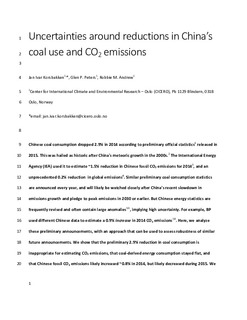| dc.contributor.author | Jackson, Robert B | |
| dc.contributor.author | Canadell, Josep G. | |
| dc.contributor.author | Le Quéré, Corinne | |
| dc.contributor.author | Andrew, Robbie | |
| dc.contributor.author | Korsbakken, Jan Ivar | |
| dc.contributor.author | Peters, Glen Philip | |
| dc.contributor.author | Nakicenovic, Nebojsa | |
| dc.date.accessioned | 2018-02-26T11:47:18Z | |
| dc.date.available | 2018-02-26T11:47:18Z | |
| dc.date.created | 2015-12-08T09:26:47Z | |
| dc.date.issued | 2015 | |
| dc.identifier.citation | Nature Climate Change. 2015, 6 7-10. | |
| dc.identifier.issn | 1758-678X | |
| dc.identifier.uri | http://hdl.handle.net/11250/2486959 | |
| dc.description.abstract | Rapid growth in global CO2 emissions from fossil fuels and industry ceased in the past two years, despite continued economic growth. Decreased coal use in China was largely responsible, coupled with slower global growth in petroleum and faster growth in renewables. | |
| dc.language.iso | eng | |
| dc.title | Reaching peak emissions | |
| dc.type | Peer reviewed | |
| dc.type | Journal article | |
| dc.description.version | submittedVersion | |
| dc.source.pagenumber | 7-10 | |
| dc.source.volume | 6 | |
| dc.source.journal | Nature Climate Change | |
| dc.identifier.doi | 10.1038/nclimate2892 | |
| dc.identifier.cristin | 1298048 | |
| dc.relation.project | Norges forskningsråd: 236296 | |
| dc.relation.project | Norges forskningsråd: 209701 | |
| cristin.unitcode | 7475,0,0,0 | |
| cristin.unitname | CICERO Senter for klimaforskning | |
| cristin.ispublished | true | |
| cristin.fulltext | preprint | |
| cristin.qualitycode | 2 | |
